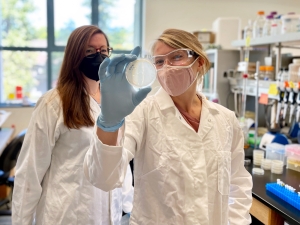

Research Bio
Kimberley Seed is an associate professor in the Department of Plant & Microbial Biology at UC Berkeley. Her lab investigates the impact of phages on the evolution and epidemiology of Vibrio cholerae, which is the causative agent of the severe diarrheal disease cholera. As a waterborne disease, cholera is a serious threat in areas of the world where sanitation is poor and access to safe drinking water is limited. Phages that specifically infect and kill V. cholerae are thought to modulate the inter-epidemic persistence of V. cholerae in the environment, thus impacting the occurrence and severity of outbreaks; however, uniquely, these phages also travel with V. cholerae into the human host and continue to prey on their bacterial host during infection. Therefore, phages have the unique potential to impact all aspects of the V. cholerae life cycle (including environmental persistence, infectivity and dissemination), on both a short and long-term evolutionary scale.
The Seed lab's current focus is on understanding the molecular basis for the anti-phage activity of mobile genetic elements in epidemic V. cholerae.
Research Expertise and Interest
interactions between bacteria and their viral predators

